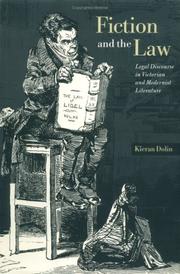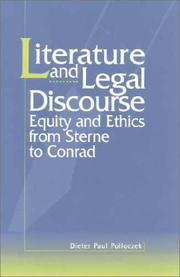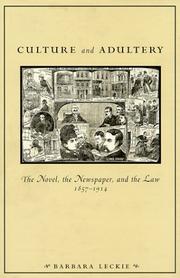| Listing 1 - 3 of 3 |
Sort by
|

ISBN: 0521623324 0521100313 0511549342 9780521623322 Year: 1999 Publisher: Cambridge : Cambridge University Press,
Abstract | Keywords | Export | Availability | Bookmark
 Loading...
Loading...Choose an application
- Reference Manager
- EndNote
- RefWorks (Direct export to RefWorks)
Law and literature have been two of the most powerful discourses in the construction of social reality. The relationship between the two has emerged as a vital area of study, as literary representation has proved immensely influential in framing popular understanding of law. In Fiction and the Law: Legal Discourse in Victorian and Modernist Literature Kieran Dolin examines the dialectical interplay between legal discourse and the novel in the century between Walter Scott and E. M. Forster, the period when the institution of the law was undergoing radical reform and the novel was at the peak of its cultural power. Dolin's comprehensive study argues that this cultural power is attributable in part to the novel's critical engagement with the law. His study draws on legal and literary theory to trace this important convergence of disciplines in a series of canonical Victorian and Modernist texts.
Law and literature --- Legal stories, English --- Modernism (Literature) --- English fiction --- History --- History and criticism --- Legal stories [English ] --- 19th century --- 20th century --- Great Britain --- Arts and Humanities --- Literature --- Law and literature - History - 19th century --- Legal stories, English - History and criticism --- Modernism (Literature) - Great Britain --- Law and literature - History - 20th century --- English fiction - 19th century - History and criticism --- English fiction - 20th century - History and criticism --- History and criticism. --- Literature and law --- English legal stories

ISBN: 0521652510 0511006241 1107117496 0521126800 0511117752 0511149867 0511303017 0511485263 1280154527 0511048270 9780511006241 0511033044 9780511033049 9780511117756 9780521652513 9780511485268 Year: 1999 Publisher: Cambridge : Cambridge University Press,
Abstract | Keywords | Export | Availability | Bookmark
 Loading...
Loading...Choose an application
- Reference Manager
- EndNote
- RefWorks (Direct export to RefWorks)
The intersection between law and literature is a developing area in literary studies. Existing work has argued that literature provides an imaginary forum in which legal ideals and practices may be tested. In Literature and Legal Discourse: Equity and Ethics from Sterne to Conrad Dieter Polloczek develops this idea by comparing the notion of equity, or ethics, in fiction with its legal equivalent. He shows how the novel, with its increasing social scope and formal sophistication, provided a means of transmitting, questioning and refining society's traditions, values and modes of self-questioning. Polloczek analyses the links between actual legal fictions like substituted judgements, notions of equity, literary tropes and the construction and representation of social bonds through sentiment, philanthropy and marginalisation. Pollozcek's study is both theoretical and historical, covering a period that extends from the eighteenth century to the modernist period, and texts from Sterne, Dickens, Bentham and Conrad.
Equity --- Law and literature --- Legal stories, English --- Ethics in literature --- Discourse analysis, Literary --- English fiction --- History --- History and criticism --- Discourse analysis, Literary. --- Ethics in literature. --- Law and literature. --- History and criticism. --- History. --- Arts and Humanities --- Literature --- Literary discourse analysis --- Rhetoric --- Literary style --- Chancery --- Actions and defenses --- Trusts and trustees --- Literature and law --- English legal stories --- Law and legislation --- Equity - Great Britain - History --- Legal stories, English - History and criticism --- English fiction - History and criticism

ISBN: 0812234987 1512805475 9780812234985 Year: 2015 Publisher: Philadelphia : University of Pennsylvania Press,
Abstract | Keywords | Export | Availability | Bookmark
 Loading...
Loading...Choose an application
- Reference Manager
- EndNote
- RefWorks (Direct export to RefWorks)
Adultery, it is often assumed, was not a major concern of English culture during the Victorian age, and the apparent absence of adultery—indeed, of all explicit representations of sexuality—in turn made censorship for obscene libel unnecessary. Very few writers, conventional wisdom has it, were bold enough to defy the powerful implicit constraints imposed upon literary production.If we find no English Anna Karenina or Madame Bovary, Barbara Leckie nevertheless demonstrates that adultery preoccupied English culture during this period. After the Matrimonial Causes Act of 1857 was passed, adultery was prominently discussed in the Divorce Court. Transcriptions of divorce trials were an immensely popular front-page feature of almost all daily newspapers for more than fifty years. At the same time as narratives of adultery stood at the center of sensation novels such as Mary Elizabeth Bradden's The Doctor's Wife, literary reviews and cultural debates strongly encouraged serious novelists to avoid the topic. In Culture and Adultery, Leckie mines novels, newspapers, court and Parliamentary records to explore several related sets of issues. How, first, did adultery become "visible" in the public sphere in the second half of the nineteenth century? Why, conversely, has the discursive history of adultery been deemphasized in the English critical tradition? And how is the history of the Victorian and early twentieth-century English novel revised when the culture's concern with adultery and censorship are reintroduced?
English fiction --- Adultery in literature --- Adultery --- Legal stories, English --- Law and literature --- American fiction --- Journalism --- Sensationalism in literature --- History and criticism --- Public opinion --- History --- English legal stories --- Literature and law --- Literature --- Writing (Authorship) --- Publicity --- Fake news --- Adulterous relationships --- Cheating, Marital --- Extra-marital sex --- Extramarital sex --- Infidelity, Marital --- Marital cheating --- Marital infidelity --- Marriage --- Sex crimes --- Paramours --- Sensationalism in literature. --- Adultery in literature. --- History and criticism. --- Public opinion. --- English fiction - 19th century - History and criticism --- English fiction - 20th century - History and criticism --- Adultery - English-speaking countries - Public opinion --- Legal stories, English - History and criticism --- Law and literature - History - 19th century --- Law and literature - History - 20th century --- American fiction - History and criticism --- Journalism - English-speaking countries
| Listing 1 - 3 of 3 |
Sort by
|

 Search
Search Feedback
Feedback About
About Help
Help News
News